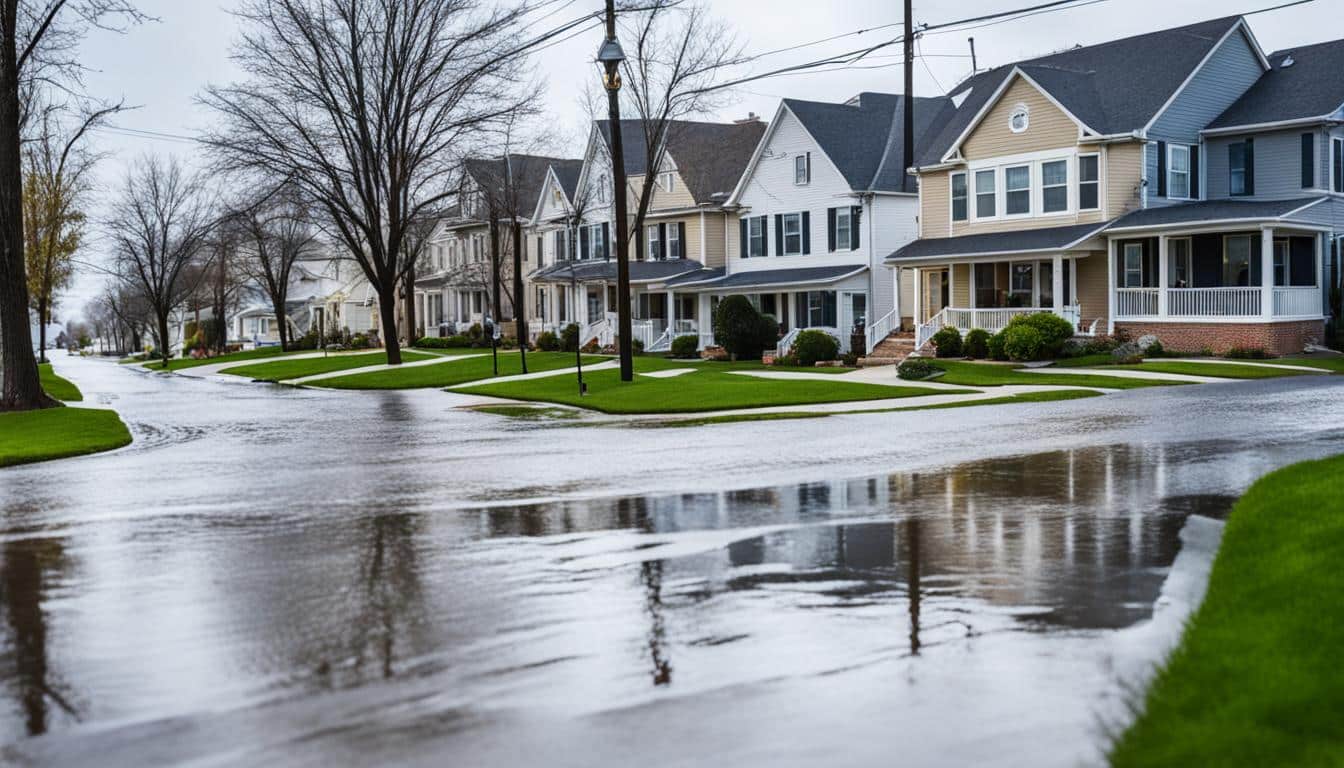When it comes to homeowners insurance, managing and reducing insurance premiums is a top priority for many homeowners. By taking proactive steps and implementing effective strategies, you can potentially lower your insurance costs, providing you with peace of mind and financial savings.
In this article, we will guide you through various ways to reduce insurance premiums and explore key factors that influence insurance costs. From understanding your coverage needs to leveraging discounts and improving home security, we will equip you with the knowledge and tools to make informed decisions about your homeowners insurance.
Reducing insurance premiums does not mean compromising on coverage or sacrificing the protection of your home. Instead, it involves maximizing savings by smartly managing your insurance policy and taking advantage of available discounts and opportunities. By following the tips and guidance provided in this article, you can navigate the world of homeowners insurance with confidence, ensuring that you have the coverage you need at a price that fits your budget.
Key Takeaways:
- Understanding your homeowners insurance coverage is crucial in managing and reducing insurance premiums.
- Factors such as your insurance provider, credit score, and proximity to natural disasters can impact your insurance premium.
- Implementing strategies like home improvements, increased security features, and proper insurance claim filing can help lower your insurance premiums.
- Take advantage of insurance discounts offered by insurance companies to further reduce your premiums.
- Comparing insurance providers and understanding your coverage needs play a role in determining the right insurance policy for your home.
Now, let’s dive deeper into each of these sections to explore how you can effectively manage and reduce insurance premiums for your home.
Understanding Homeowners Insurance Coverage
Before we delve into ways to reduce insurance premiums, it’s important to understand the basics of homeowners insurance coverage.
Types of Coverage
Homeowners insurance provides coverage for various risks and hazards that can affect your home and belongings. These typically include:
- Property Damage: Coverage for damage to your home’s structure, including walls, roof, and foundation.
- Personal Belongings: Coverage for your personal belongings, such as furniture, appliances, and clothing.
- Liability Protection: Coverage for legal costs and damages if someone is injured on your property.
It’s important to carefully review your insurance policy to understand the specific coverage it provides.
Deductibles
A deductible is the amount you must pay out of pocket before your insurance coverage kicks in. For example, if you have a $1,000 deductible and file a claim for $5,000 in damages, you will pay the $1,000 deductible and your insurance company will cover the remaining $4,000.
Choosing a higher deductible can often help reduce your insurance premiums. However, it’s important to weigh the potential savings against the cost you would have to bear in the event of a claim.
Additional Coverage
While homeowners insurance typically provides coverage for common risks, such as fire, theft, and vandalism, it may not cover certain perils like floods or earthquakes. If you live in an area prone to these types of events, it’s important to consider additional coverage, such as flood insurance.
Flood insurance is a separate policy that can help protect your home and belongings in the event of a flood. It is important to assess your property’s flood risk and evaluate whether flood insurance is necessary for your home.
Understanding the various aspects of homeowners insurance coverage will help you make informed decisions when it comes to managing and reducing your insurance premiums.
Factors Affecting Homeowners Insurance Premiums
When it comes to homeowners insurance, several factors can influence the premiums you pay. Understanding these factors can help you make informed decisions and potentially lower your insurance costs. In this section, we will explore the impact of the insurance provider, credit score, proximity to natural disasters, shopping around for quotes, insurance claims, and more.
The Insurance Provider
The choice of insurance provider can significantly affect your homeowners insurance premiums. Each insurance company may use different algorithms to calculate rates, resulting in varying costs for the same coverage. It’s essential to research and compare insurance providers to find the one that offers the best rates and coverage options for your needs.
Credit Score
Your credit score can play a role in determining homeowners insurance premiums. Insurers often consider credit history as an indicator of responsibility and financial stability. Maintaining a good credit score can help you secure lower insurance rates, so it’s crucial to stay on top of your credit and make timely payments.
Proximity to Natural Disasters
The geographical location of your home can impact your insurance premiums. Areas prone to natural disasters such as hurricanes, earthquakes, or wildfires may have higher insurance costs due to increased risk. If you live in a high-risk area, it’s essential to be prepared and consider additional coverage options to protect your property.
Shopping Around for Quotes
One of the most effective ways to find affordable homeowners insurance is to shop around for quotes. By comparing policies and rates from different insurance companies, you can identify potential savings opportunities. Take the time to gather multiple quotes, review coverage details, and consider bundling your policies for additional discounts.
The key to finding affordable homeowners insurance is to shop around and compare quotes. Don’t settle for the first offer you receive. By taking the time to explore different options, you can secure the most competitive rates and suitable coverage for your home.
Insurance Claims
Your insurance claims history can impact future premiums. If you frequently file claims or have a history of high-value claims, insurance companies may consider you a higher risk. It’s important to weigh the benefits of filing a claim against the potential impact on your insurance premiums. Assess the situation and consider if it’s worth filing a claim or if minor repairs can be handled without involving your insurance company.
Understanding the factors that influence homeowners insurance premiums can help you make informed decisions and potentially save money. Remember to choose the right insurance provider, maintain a good credit score, consider the proximity to natural disasters, shop around for quotes, and carefully evaluate whether filing an insurance claim is necessary. By taking these factors into account, you can effectively manage your insurance costs while ensuring your home is adequately protected.
Effective Ways to Lower Your Reduce Insurance Premiums
Lowering your insurance premiums is possible with a few strategic approaches. By implementing these effective strategies, you can save money and secure the coverage you need for your home. Let’s explore some practical ways to achieve this:
1. Home Improvements:
Enhancing your home’s structural integrity and making safety upgrades can lower your homeowners insurance rates. Consider installing storm shutters, reinforcing the roof, or updating outdated electrical systems. These improvements demonstrate your commitment to safeguarding your property, which may lead to discounts from your insurer.
2. Increased Security Features:
Investing in security systems and devices can effectively reduce the risk of theft and property damage, resulting in lower insurance rates. Install burglar alarms, motion-sensor lighting, and surveillance cameras to protect your home. Discuss these security enhancements with your insurance agent to explore potential discounts.
3. Properly Filing Insurance Claims:
When filing an insurance claim, it’s essential to follow the correct procedure and provide accurate documentation. Failure to do so can result in claim denials or increased premiums. Work closely with your insurance agent throughout the claims process to ensure all necessary information is provided and documented correctly.
4. Regularly Review Your Policy:
Review your homeowners insurance policy periodically to ensure it accurately reflects your needs. As your home and circumstances change, adjustments may be required to optimize your coverage and premiums. Consult with your insurance agent to make any necessary updates or modifications to your policy.
5. Shop Around and Compare:
Don’t settle for the first insurance quote you receive. Take the time to shop around and compare rates from different insurance companies. This allows you to evaluate various coverage options and find the most competitive premium rates. Consider consulting an independent insurance agent who can provide multiple quotes from different insurers.
Remember, choosing the lowest premium isn’t always the best option. Ensure the policy provides adequate coverage and consider the insurer’s reputation and customer service quality.
To sum up, reducing your homeowners insurance rates involves a combination of proactive measures, such as home improvements, increased security features, proper claims filing, policy reviews, and diligent comparison shopping. By implementing these strategies, you can maximize your savings while maintaining the protection your home deserves.

| Strategy | Benefits |
|---|---|
| Home Improvements | Lower insurance rates by demonstrating improved property safety. |
| Increased Security Features | Reduce the risk of theft and property damage, resulting in potential discounts. |
| Properly Filing Insurance Claims | Ensure claim approval and prevent potential premium increases. |
| Regular Policy Review | Optimize coverage and premiums as your home and circumstances change. |
| Shop Around and Compare | Find the most competitive premium rates and suitable coverage options. |
Taking Advantage of Insurance Discounts
When it comes to managing your insurance premiums, taking advantage of insurance discounts can make a significant difference. Insurance companies often offer various discounts to policyholders, allowing them to reduce their premiums and save money. Understanding the types of discounts available and how to qualify for them can help you optimize your insurance coverage while keeping costs down.
One common type of discount is the “reduce the risk” discount. Insurance providers often offer this discount to homeowners who take proactive steps to mitigate potential risks. By implementing safety measures such as installing smoke detectors, fire alarms, and security systems, you can reduce the risk of property damage or theft. These precautions demonstrate to insurers that you are a responsible homeowner, leading to lower insurance premiums.
Another discount to consider is the “rebuild your home” discount. This discount is available to homeowners who choose to rebuild their homes with certain features and materials that reduce the risk of damage. For example, using fire-resistant roofing materials or installing impact-resistant windows can make your home more resilient to natural disasters. By rebuilding your home with these features in mind, you can not only enhance its safety but also qualify for insurance discounts.
Insurance providers also offer discounts for factors such as being a loyal customer, having a claims-free history, or bundling multiple policies with the same company. It’s important to review your policy and discuss potential discounts with your insurance agent to ensure you are taking advantage of all available options.

By taking advantage of insurance discounts, you can effectively reduce your premiums while maintaining adequate coverage for your home. Remember to explore the different types of discounts offered by insurance companies and implement measures that can help reduce risks. This way, you can optimize your savings and enjoy the peace of mind that comes with comprehensive and affordable insurance coverage.
| Types of Insurance Discounts | Description |
|---|---|
| Reduce the Risk Discount | Reduced premiums for homeowners who implement safety measures to mitigate risks such as installing smoke detectors, fire alarms, and security systems. |
| Rebuild Your Home Discount | Discounts offered to homeowners who choose to rebuild their homes with features and materials that reduce the risk of damage, such as fire-resistant roofing materials and impact-resistant windows. |
| Loyalty Discount | Discounts for policyholders who have been loyal customers of an insurance company for a certain period of time. |
| Claims-Free Discount | Discounts for homeowners who have not filed any insurance claims within a specified period. |
| Multi-Policy Discount | Discounts for bundling multiple insurance policies with the same company, such as combining home and auto insurance. |
Determining the Right Coverage for Your Home
When it comes to managing insurance premiums, understanding the coverage you need for your home is essential. Your coverage limits and needs are determined by the insurance company, so it’s important to have a clear understanding of this process.
The coverage you need for your home depends on various factors, such as the value of your property, the location, and the potential risks it may face. Insurance companies evaluate these factors to determine the appropriate coverage limits for your home.
One key aspect in determining the right coverage for your home is assessing the replacement cost. This refers to the amount of money it would take to rebuild your home if it were completely destroyed. The insurance company takes into consideration factors such as construction materials, square footage, and custom features when determining the replacement cost.
In addition to the physical structure, the insurance company also considers coverage for your personal possessions. This includes furniture, electronics, clothing, and other personal items. It’s important to accurately estimate the value of these belongings to ensure you have adequate coverage.
Remember, the insurance company determines the coverage limits for your home based on various factors. It’s crucial to provide accurate and detailed information to obtain the appropriate coverage for your needs.
Furthermore, you should also consider additional coverage options to protect against specific risks. For example, if you live in an area prone to flooding, you may need to purchase separate flood insurance, as it is not typically covered under standard homeowners insurance.
To better understand the coverage you need, it’s advisable to consult with an insurance agent. They can assess your specific situation and provide guidance on the appropriate coverage limits for your home. By ensuring you have the right coverage, you can protect your property and minimize potential financial burdens.
Factors to Consider when Determining Coverage
When determining the right coverage for your home, there are several factors you should consider:
- The value of your property
- The location of your home
- The potential risks and perils in your area
- Your personal budget and financial situation
By considering these factors, you can make informed decisions about the coverage limits that suit your needs and budget. Remember, it’s important to regularly review your coverage and make adjustments as necessary to ensure you stay adequately protected.
Common Types of Homeowners Insurance Coverage
| Coverage Type | Description |
|---|---|
| Property Coverage | Covers the physical structure of your home, including walls, roof, and foundation. |
| Liability Coverage | Provides protection if someone is injured on your property and you are found legally responsible. |
| Personal Property Coverage | Covers the loss or damage of personal belongings, such as furniture, electronics, and clothing. |
| Additional Living Expenses Coverage | Pays for temporary housing and related expenses if your home is uninhabitable due to a covered loss. |
| Medical Payments Coverage | Covers medical expenses if someone is injured on your property, regardless of fault. |
Keep in mind that these are just a few examples of the coverage options available. Your insurance agent can provide further information and guidance on additional coverage options that may be suitable for your specific needs.
Understanding the coverage you need and working with your insurance company to determine the appropriate coverage limits is crucial in managing your insurance premiums effectively. By ensuring you have the right coverage for your home, you can have peace of mind knowing that you are adequately protected.

The Role of Home Security in Reducing Premiums
When it comes to protecting your home, implementing effective home security measures is not only crucial for the safety of your property and loved ones but can also have a significant impact on your insurance premiums. By reducing the likelihood of claims and enhancing the overall security of your home, you can potentially enjoy lower insurance costs.
There are various home security options available that can greatly contribute to reducing the risk of incidents and protecting your home. These options include:
- Security systems: Installing a professionally monitored security system provides round-the-clock surveillance and immediate response to any suspicious activities. This can deter potential burglars and reduce the chances of theft or vandalism, ultimately leading to lower insurance premiums.
- Smart home technology: Utilizing smart home devices, such as smart locks, security cameras, and motion sensors, can enhance the security of your property. These devices allow you to monitor and control your home remotely, adding an extra layer of protection and peace of mind.
- Security lighting: Well-lit exteriors can discourage intruders and increase the visibility of any unusual activities around your home. Installing motion-activated outdoor lighting can be an effective deterrent, reducing the likelihood of burglaries and potential claims.
- Reinforced doors and windows: Upgrading your doors and windows with stronger materials and reinforced locks can make it more difficult for intruders to gain access to your property. Insurance companies often offer discounts for homes with enhanced structural security.
By implementing these home security measures, you not only protect your home and reduce the risk of incidents but also demonstrate to your insurance provider that you are proactive in safeguarding your property. This can result in potential premium reductions and savings on your homeowners insurance policy.
Case Study: The Impact of Home Security on Insurance Premiums
“After installing a comprehensive home security system, including cameras, motion sensors, and smart locks, I noticed a significant reduction in my insurance premiums. The insurance company recognized the increased security measures I had taken and rewarded me with a lower rate. Not only do I feel safer, but I am also saving money in the long run.”
As demonstrated by Jane’s experience, taking proactive steps to protect your home can lead to tangible benefits, including potential premium reductions. Home security not only enhances the security of your property but also demonstrates to your insurance provider that you are committed to reducing the risk of incidents. This proactive approach can translate into financial savings and help you achieve more cost-effective coverage for your home.

| Benefits of Home Security Measures | Impact on Insurance Premiums |
|---|---|
| Reduced risk of burglaries and theft | Potential premium reductions |
| Improved home safety and peace of mind | Lower likelihood of claims |
| Enhanced protection against vandalism | Potential discounts from insurance companies |
| Deterrent for potential intruders | Increased overall security rating |
The Value of Comparing Insurance Providers
When it comes to managing your insurance costs, one of the most effective strategies is to compare insurance providers. Different insurance companies and insurance agencies can have varying rates, coverage options, and discounts. By taking the time to shop around and explore your options, you can lower your insurance costs without compromising on quality coverage.
One of the key benefits of comparing insurance providers is finding better insurance rates. Each insurance company has its own way of assessing risk and determining premiums, which can result in significant variations in pricing. By obtaining quotes from multiple providers, you can identify the insurer that offers the most competitive rates for your particular needs.
Additionally, different insurance companies may specialize in certain types of coverage or offer unique policies tailored to specific demographics. By exploring options from various providers, you may discover coverage options that better align with your requirements and budget.
Tips for Finding the Best Insurance Rate
When comparing insurance providers, keep the following tips in mind to help you find the best insurance rate:
- Research and gather information about different insurance companies.
- Contact an insurance agent or agency to discuss your coverage needs and get personalized recommendations.
- Consider bundling your insurance policies with the same provider to take advantage of multi-policy discounts.
- Review customer reviews and ratings to gauge the quality of service provided by each insurance company.
- Don’t forget to inquire about available discounts, such as safe driver discounts, loyalty rewards, or discounts for certain professional affiliations.
By following these tips, you can navigate the insurance market more effectively and find the insurance provider that offers the best combination of coverage, service, and price.
Remember, lowering your insurance costs doesn’t necessarily mean sacrificing coverage or quality. It’s all about finding the right balance and leveraging the options available to you.
Next, we will explore the factors that influence homeowners insurance costs and how you can take steps to lower your insurance costs.
Factors That Influence Homeowners Insurance Costs
When it comes to property insurance, the cost of insurance can vary based on several key factors. Understanding these factors can help you make informed decisions to lower your insurance costs without sacrificing the coverage you need. Let’s explore the main elements that influence homeowners insurance costs:
1. Value of Your Home
The value of your home plays a significant role in determining your insurance premium. Insurance companies consider the replacement cost of your home and its features, including the materials used, construction quality, and any unique architectural elements. As the value of your home increases, so does the cost of property insurance.
2. Coverage Needs
Your coverage needs also impact your homeowners insurance costs. The level of protection you choose for your property, personal belongings, and liability will affect your premium. Higher coverage limits and additional policy endorsements can increase the cost of insurance, while opting for lower coverage limits can help lower your insurance costs.
3. Location and Risks
The geographical location of your home plays a significant role in determining insurance costs. Areas prone to natural disasters such as hurricanes, earthquakes, or floods generally have higher insurance premiums. Additionally, proximity to fire-prone areas or locations with higher crime rates can increase the risks associated with your property, impacting your insurance rates.
4. Deductible Amount
The deductible is the amount you must pay out of pocket before your insurance coverage kicks in. Choosing a higher deductible can lower your insurance premium, as it shifts more of the financial responsibility to you in the event of a claim. However, it’s important to ensure you can comfortably afford the deductible amount in case of a loss.
5. Home Security Measures
Investing in home security measures can help reduce the risk of theft, vandalism, or damage to your property. Insurance companies often offer discounts for installing security systems, surveillance cameras, and smoke detectors. By implementing these security measures, you can potentially lower your insurance costs while protecting your home and loved ones.

6. Claims History
Your claims history also influences your insurance costs. A history of frequent or costly claims may indicate a higher risk to insurance companies, resulting in higher premiums. Conversely, maintaining a claims-free record can help keep your insurance costs lower. It’s important to consider whether it makes financial sense to file a claim or handle smaller losses out of pocket to avoid potential premium increases.
By understanding the factors that influence homeowners insurance costs, you can make informed decisions to lower your insurance premiums without sacrificing the necessary coverage for your property. Now, let’s explore effective strategies to help you lower your insurance costs even further.
Conclusion
In conclusion, by implementing the effective strategies and tips discussed in this article, you can successfully manage and reduce insurance premiums for your home. These premium reduction strategies can help you lower your insurance costs and enjoy a more affordable and cost-effective coverage for your property.
By taking advantage of insurance discounts, comparing providers, and understanding the coverage you need, you can make informed decisions that result in significant premium savings. Additionally, enhancing your home security measures and considering factors that influence insurance costs can further contribute to reducing your premiums.
Remember, reducing insurance premiums is not only about saving money, but also about ensuring that you have the right coverage and protection for your home. Take the time to evaluate your insurance policies, consult with an insurance agent, and explore different ways to lower your homeowners insurance rates. By proactively applying these premium reduction strategies, you can achieve financial peace of mind while safeguarding your most valuable asset.
Also Read : Protecting Your Future: The Importance Of Safety Insurance





